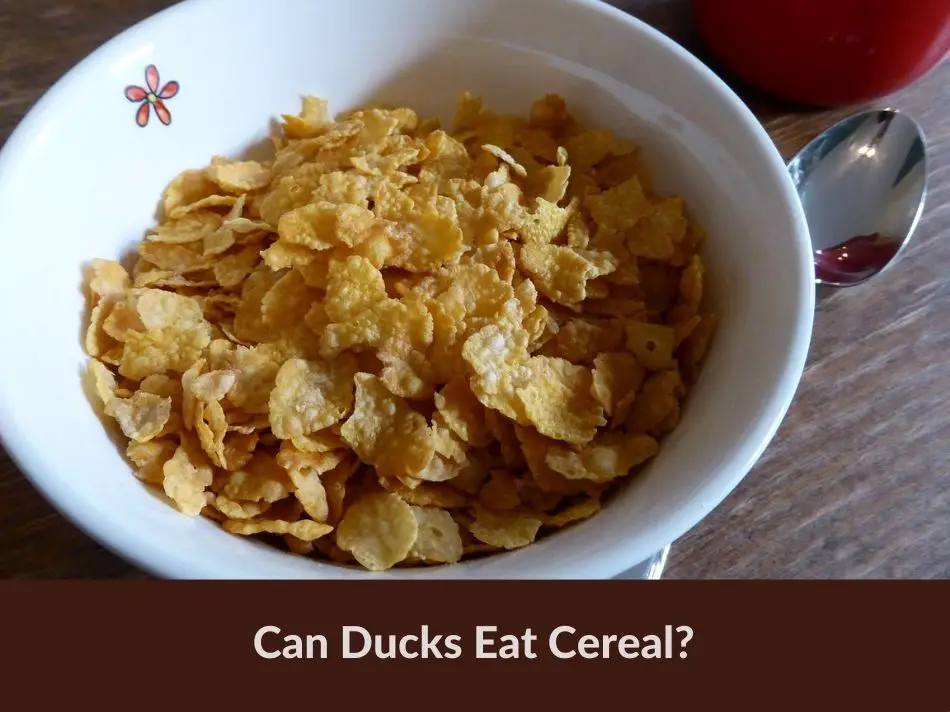Ducks are omnivorous birds, meaning they consume a variety of foods. In the wild, their diet largely consists of aquatic plants, small fish, insects, and even small amphibians. Their beaks are designed to filter food items from water, allowing them to graze on plants and sift through silt to find tiny prey. But, can ducks eat cereal?
Yes, ducks can eat cereal, but it should be given in moderation and with certain precautions. Cereal, especially those without added sugars or artificial flavors, can serve as a quick snack for ducks. Unprocessed grains like oats, barley, and rice are typically safer than processed cereals, which often contain additives and high sugar content.
This article delves into the nutritional suitability of cereal for ducks. We’ll touch upon the natural diet of ducks, address the question of feeding them cereal, guide caretakers on feeding frequency, and discuss the implications for ducklings.
How Often Can I Feed My Ducks Cereal?
Cereal should not form a significant portion of a duck’s diet. It’s best viewed as an occasional treat rather than a dietary staple. You might consider offering cereal once in a while, perhaps once a week or even less frequently.
Too much cereal can also lead to nutritional imbalances. Ducks need a varied diet to get all the essential nutrients. Over-reliance on cereal can deprive them of vital vitamins and minerals they’d get from a more diverse food source.
Can Ducklings Eat Cereal?
Ducklings are much more sensitive than mature ducks and require a diet rich in protein to support their rapid growth. While it might be tempting to offer them a bit of cereal, it’s not the best idea. They require specific nutrients for proper development, and cereal doesn’t provide them with all they need.
For those raising ducklings, it’s best to rely on specially formulated duckling starter feed, which is important for them to receive all essential nutrients. If you come across ducklings in a park or another public setting, it’s best to refrain from feeding them altogether, as their dietary requirements are quite specific.
Is Cereal Healthy For Ducks?
Cereal, in its basic form, derives from grains that are rich in carbohydrates. These carbs can provide energy for ducks, much like they do for humans.
Let’s break down the nutritional components and what they mean for our feathered friends.
- Carbohydrates: The primary nutritional component in most cereals is carbohydrates, which can offer ducks a quick energy boost. While their natural diet consists mainly of insects, aquatic plants, and small fish, which provide a balance of protein, fats, and carbs, an occasional intake of cereals can be an energy source.
- Proteins: Grains, especially whole grains, contain proteins, though not in amounts as high as insects or worms would offer. For ducks, proteins are crucial for muscle building and repair. While cereals can contribute to their protein intake, they shouldn’t be the primary source.
- Fibers: Whole grain cereals are a good source of dietary fiber. Fiber aids in digestion and can be beneficial for ducks, especially those in domestic settings where they might not get as much exercise as their wild counterparts. Proper digestion can contribute to the overall health of the bird.
- Vitamins and Minerals: Some cereals are fortified with vitamins and minerals. These added nutrients can benefit ducks if given in appropriate amounts. For example, vitamins like B-complex can help in energy production, while minerals like iron can assist in oxygen transportation in the blood.
- Additives and Sugars: Many commercial cereals contain additives, preservatives, and high sugar content. These are not beneficial for ducks and can even be harmful. High sugar content can lead to obesity and other health issues. Artificial additives might interfere with their digestion or even introduce toxins.
- Fats: Some cereals might contain fats, especially those with added nuts or seeds. While fats are a necessary component of a duck’s diet, especially for water-proofing their feathers, it’s essential to monitor the source of these fats. Natural fats from seeds or grains can be beneficial, while processed or saturated fats are less ideal.
How To Feed Cereal To Ducks
- Choose the Right Cereal: Opt for plain, unflavored cereals that are free from artificial additives, preservatives, and high sugar content. Whole grain varieties like oats or barley are preferable.
- Portion Control: Don’t overfeed. A small handful per duck is usually a good amount. Remember, cereals are treats, not main meals.
- Break Larger Pieces: If the cereal consists of large flakes or chunks, consider breaking them into smaller, bite-sized pieces for easier consumption.
- Avoid Moldy Cereal: Check the cereal for any signs of mold or spoilage. Discard any that seems off or stale.
- Scatter the Cereal: Instead of placing it in a large pile, scatter the cereal on the ground. This mimics the foraging behavior of ducks and encourages natural feeding habits.
- Always Provide Fresh Water: When feeding ducks anything, especially dry foods like cereal, always provide them with clean, fresh water. This aids in digestion and prevents potential choking hazards.
More Grains Ducks Can Eat
Grains play a significant role in the diet of many bird species, including ducks. They provide an array of essential nutrients and are easy to digest, making them a popular food choice for both wild and domesticated ducks.
Below are more grains ducks can eat:
Be sure to explore our list of human food suitable for ducks.
Conclusion
In conclusion, while cereals can provide certain nutrients to ducks, they lack the complete nutritional profile these birds require. Cereal’s primary value is its carbohydrate content, offering quick energy.
The occasional inclusion of cereal in a duck’s diet can be acceptable if one pays attention to its type and make sure it’s free from harmful additives and sugars. Always prioritize a balanced diet, which includes natural foods and specially formulated duck pellets to keep them thriving.
Disclaimer: The information in this article is for informational purposes only. I'm not an expert or a veterinarian.


